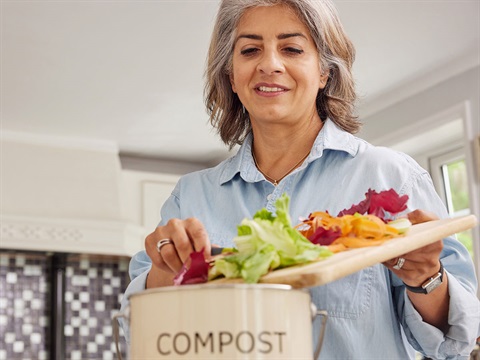SB 1383: State organics law

In September 2016, SB 1383 (Lara, Chapter 395, Statutes of 2016) established statewide methane emissions reduction targets in an effort to reduce emissions of short-lived climate pollutants (food scraps, yard debris, paper products, etc.) in various sectors of California’s economy. It includes statewide goals to reduce the disposal of organic waste and recover edible food for human consumption. The goal to reduce organic waste by 50% by Jan. 1, 2020, and by 75% by Jan. 1, 2025.
The intent and purpose of SB 1383 is to:
- Reduce landfill waste and pollution
- Fight against climate change
- Reduce and recover food from landfill to feed those in need
- Recycle organic materials into new products
According to CalRecycle, landfills are California's third largest source of methane. Organics and compostable materials in landfills breakdown without oxygen. As a byproduct, this emits methane into the atmosphere. Methane is 84 times more potent than carbon dioxide and is one of most potent greenhouse gases. As a result, organic waste in landfills produces 20% of the state’s methane.
On a local scale, 71% of the landfilled materials in San Mateo County are organic materials. So, it is important for us to compost these organic materials or to create programs to collect surplus food for people in need to eat.
Organic collection services
For single-family homes, monthly collection rates include recycling and composting services. All single-family homes must subscribe to and take part in curbside organics collection.
Multifamily complexes and businesses, must subscribe to and take part in curbside organics collection or self-haul organic waste. Businesses must also, annually and as needed, educate employees, contractors, tenants, and customers about proper sorting of organic material into correct containers.
Businesses and multifamily properties can apply for waivers if they generate minimal amount of compostable/organic waste. Learn more about the waiver and the pre-screening application on RethinkWaste’s organics collection waiver application webpage.
View the acceptable compost materials on Recology’s What Goes Where webpage.
To set up compost service, please contact Recology San Mateo County.
Edible food recovery program
The law requires jurisdictions to establish food recovery programs, to provide large food-service businesses, such as grocery stores, hotels and restaurants, the ability to donate surplus edible food to food recovery organizations. The County of San Mateo Office of Sustainability leads this program in partnership with the city.
Visit the county’s mandatory edible food recovery requirements to learn more.
Buy recovered organics products
Beginning Jan. 1, 2022, the city must:
- Buy a specific amount of compost, mulch or biogas, annually
- Buy at least 30% recycled content paper products
- Follow the state's construction and demolition ordinance, which requires that 60% of construction debris, like lumber, be diverted from the landfill
- Follow the state's model water efficient landscape ordinance, which requires that compost and mulch for landscaping
Education and outreach
In partnership with the city, RethinkWaste, Recology, and the County of San Mateo provide educational materials and community outreach in various languages to provide information on the SB 1383 requirements and composting.
- RethinkWaste is the waste management authority that manages compliance with SB 1383 on behalf of Menlo Park. Its responsibilities include record keeping, contract management with Recology and outreach and education.
- Recology San Mateo County is the city’s waste hauler, who enrolls residents and businesses with composting services.
- The County Office of Sustainability created and implemented an edible food recovery program and will assist with the outreach and enforcement components.
Compliance and enforcement
Cities must adopt and enforce certain ordinances required by SB 1383 regulations. The City Council adopted is SB 1383 requirements ordinance Nov. 16, 2021, and an amended purchasing policy to include purchasing recycled-content paper products Dec. 14, 2021. Menlo Park already adopted the CALGreen building code and a water efficient landscaping ordinance. We are also working toward meeting an annual procurement target for recovered organic waste products, such as compost and mulch.
Enforcement will begin in 2024 and entities that do not follow SB 1383 can face penalties.
Contact us
Recology San Mateo County
To add, change or for questions about garbage, recycling or composting services
Website
Email
650-595-3900